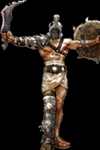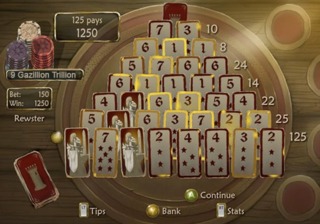Spray-Paint Sims, Exploits (Getting Up, Gladius)
By ahoodedfigure 1 Comments
I got to to play two games this weekend (other than a little Puzzle Pirates): Getting Up and Gladius. First I'll talk about the latter two a bit, then go into specific topics that came up about games in general that I'd like to talk about.
Gladius
Played a ton of Gladius this weekend. Played as both the starting characters, after being disappointed with the ease of difficulty on the barbarian side of things. I think by the time I got exhausted with the game I'd actually made more progress as the Romanesque Valens than the barbarian Ursula, even though I started with the latter.
I like a lot of that game, but it's difficult sometimes to judge the difficulty of the matches before you're in the middle of them, and the rock-paper-scissors mechanic that's supposed to let light troops be good against heavy troops only works when the light ones have sufficient skills to be able to push the heavy guys and gals around. Until then, the light troops are rather pitiful against heavies. I don't remember this being as much of a problem in the Barbarian campaign; it was like the damage and stuff was more in my favor then, and berserkers (who don't have bear skin cloaks despite their name. Are those bear skin loincloths?) are capable light troops compared to bandits trying to take down samnites, if that makes any sense.

The equipment system and match preview takes a bit of time to navigate, and I feel like I have to dive down a few menus to do something that a few more sideways button presses could have cured.
The game is, basically, a nice tactics game. With such games, though, come the issue of balance. I felt like some of my troops seemed to jump up too quickly in power, and that I was slaughtering some enemies in one hit, while not making much of a dent in other enemies. It's nice to nuke guys with a javelin but I want some level of challenge (but not so much that I'm nipping at a badguy turn after turn, hoping I have the edge in some war of attrition).
I woke up wanting to play Gladius so I'll take that as a sign that they're doing the right thing. I enjoy equipping my squad, balancing my roster, leveling my troops. The acting is usually good, and there are a lot of good touches that help make the cutscenes feel like actual acting and not like dolls spitting out lines. The old criticisms I remember reading about this game (about troops not in the battle still getting experience, which is so small that it doesn't matter in my opinion) don't fit, but then I have new criticisms to replace it, so I guess it's easy to say it's a good game, but not so good that the flaws don't grate a bit.
Getting Up
After putting down Gladius I popped in Getting Up. Played through just the first few levels. I hope that the main character (nicknamed Trane) will get a bit of development; right now I know that he lives in a place worth rebelling against, but other than his disagreeing with everyone else's method of protesting I guess I don't know where the guy is coming from. It's early yet so I don't have a lot to say. I think some of the tracks are a bit too repetitive to keep hearing throughout a level. The pool level almost drove me crazy.
The philosophy behind it better come up front more, because right now it feels like an inside joke. I think competition can be a good thing, but covering up another person's tag that happens to also be protesting the same group of thugs that you're working against seems counterproductive. Is he really into protesting, or just getting a name for himself? Goes back to not knowing the guy too well.
Ran into a stupid bug that made me reset the third level, which was irritating but not a big setback. Nothing more to say, really. Still too early.
Graffiti Sims
It's the details in these two systems that have me wishing the two groups could have conferred. I haven't played Jet-Set Radio, so I don't know if their tag system has any detail to it, but I'm going to detail each of the two systems and how they seem to be two parts of a whole.
Complete freedom in a tag system might feel a bit pointless. I already wonder why I get a choice of tags in Getting Up, since varying the tags doesn't seem to affect things at all. If I could do whatever I wanted, that might be neat, but then I'd want a full set of drawing tools, and I'd want to save my work... all of which could just done better on a PC where you have more control over design in much simpler programs. So a full sim may not work in a game that didn't focus completely on the art. So the designers of the two games limit your ability to tag in different ways, while still having some feel and challenge. Part of me wonders if their two
The Warriors has limited paint. When you run out, you have to buy more or find it. This can lead you all over town, doing crime to make money for new cans. I don't mind that so much because it makes you really focus to try to get your tag up and not waste time or paint. Getting Up has unlimited paint, unlimited ink, unlimited stickers. This is OK, but it's up to the designer on how difficult getting paint is going to be. If it's a limited commodity but not a stretch to get, I like the idea that it makes you choosy about what you're going to do and how well you're going to do it.
The spray mechanic itself for Warriors is little more than a minigame, though. You move a cursor over a pattern that pops up off-center, and you try to stay in the lines until you reach the end of the path. That means a successful tag, or a successful layer on a more detailed tag. It simulates the tension and demands of art, but it helps you realize putting up graffiti is not the focus of this game. Getting up has you doing a tag in a single layer (no matter how many colors the tag has). You hold the spray button and move your hand around with the stick to try to cover the outlined space. While you have unlimited paint, you have to watch out for spraying in one place too long: a patch of wetness pops up when you've covered one spot too long, which means if you don't stop spraying or move on the paint will run, decreasing the value of the tag. The can will also run low on pressure (thus the double-entendre subtitle "contents under pressure," I guess), so if you spray too long it sputters and you have to let go of the spray button so Trane will shake the can.
So, I like the Warriors for three reasons: because tagging isn't a chore, you get a sense of accomplishment putting a tag up, but don't worry about the act so much because there's a lot of things to do other than tagging. I like the limited paint, because it means you're conscious of what you need to do, what resources you have, how skilled you are, and you calculate the risk of putting ip a tag based on that. Finally, and most important, when you put up a detailed tag with separate colors, you do each of those colors in separate layers. A black base, followed by white letters, then detailing... It makes it really satisfying to put up something complex, however rare it is to do that.
Getting Up is a superior sim because it actually puts more focus on styles, color, and some of the problems of painting with spray cans. But why not have layers? It's all the more glaring an omission when you have something that feels more real, but then you're laying down a whole tag in one pass instead of using different colors.
Both systems make concessions because they recognize that a full-on sim would be a bit too labor intensive for the stories they want to tell, but for me it's a bit disappointing to see elements that could have been combined into a more robust experience.
My ideal sim would just be Getting Up's great thickness/drip mechanic combined with limited resources (paint colors, stickers, pens) and layering, where you put down different coats to get effects (and maybe the more detail you're willing to get in, the higher reputation bonus you get, but it puts you at risk for being spotted). Maybe some freeform would be cool too, but then it would have to be a world that remembered your tag and didn't just cast it away when you beat a "level." Something sandboxy, maybe, that saved your work and remembered what it looked like to call it up again when you go near the wall you worked on... and you had to be on the lookout for defacers, and the weirder the spot you put it in, the less likely it would be defaced, and the more likely it would gain respect from other artists. There'd be the stunt crowd, who respect dangerous places to put up tags, the bravery crowd that likes it when you put it in spots where you might easily be nailed by authorities, all kinds of possibilities. Maybe someone in the future will try this? I think there's a lot of potential here.
Exploits

Except I won't do it again. It's the same reason cheats ruin a game, even if it's not explicitly cheating: by throwing the balance in your favor you make a whole part of the game irrelevant (in this case, purchasing things). People who feel entitled to exploit no matter what are basically giving up on the game. If they KNOW in their guts what they're doing is not what the game makers intended, they're cheating. Hell, I've done it sometimes, I'm not being holier-than-thou by any means. But I figure if it's something simple and huge like the treasure chest thing above, it ceases to be entertaining. I'm not a robot, I can choose not to do these things, and thereby bypass ruining the whole damned game.
If an NPC flips out and I'm able to defeat him or her because of a fumble in code, that's a cheat I can live with. If the game glitches out, like in the embarassing KOTOR II, and I'm able to skip out on a problematic encounter, that's perfectly fine. But both of these examples have you getting away with something once. It's when you repeat it that it becomes problematic, because if you choose to do this every time, you're purposefully walking around the reality the game makers set up.
It's in no way the user's fault for the bug being there, though, and if people are cheating because they're indignant that the writers didn't lay down tougher code, I understand that. But I'm not going to exploit something just because it's there and then complain about how the game is ruined. If I can avoid it, I'll try, even if the reality of the game takes a hit.
Closing
I think I'll be doing some Gladius again today, and maybe some Getting Up. If anyone wants to chime in, some topics could be exploits you managed to avoid the second time around, or graffiti in games.

1 Comments